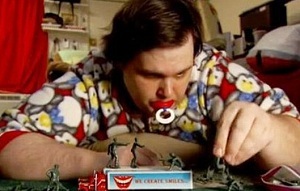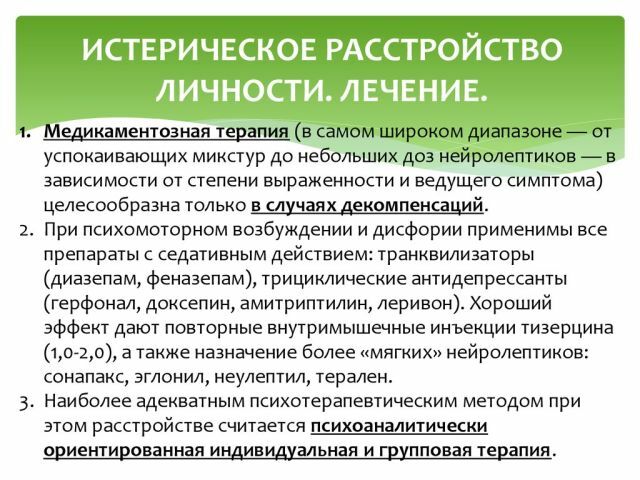 Puerilism is a kind of dissociative disorder. As an independent disease it is not classified. Pathology is a reaction of a kind of protection after experiencing severe shock, stress, head trauma, or it can be a complication of mental illness. Patients with a disorder never think of suicide.
Puerilism is a kind of dissociative disorder. As an independent disease it is not classified. Pathology is a reaction of a kind of protection after experiencing severe shock, stress, head trauma, or it can be a complication of mental illness. Patients with a disorder never think of suicide.
Puerilism manifests itself against the background of hysterically narrowed consciousness in adult patients by behavior peculiar to children. It is considered a reversible regression of the human psyche. This subspecies of psychogeny can appear with senile dementia, classical schizophrenia, hypochondria, and gebephrenia.
Causes of violation of
In the pathological process at the tissue level, there is a deterioration in the rate of pharmacy in the subcortical area of the brain that regulates a person's psychological response to the surrounding reality. Especially dangerous is the appearance of a re-provoking factor.
With the development of this form of hysterical psychosis, specific behavior is observed, as well as a certain staging.
Traumatic events are psychogenic or chronic. In the first case, the disorder is formed suddenly( after trauma, illness or stress), and even a strong-willed person can not cope with a sudden effect, in the second - against the background of a long-running underlying disease of the psyche, a series of life failures in people with a weak character.
Signs of disorder
A patient with Puerilism syndrome begins to be afraid of dying from an incurable disease that he has never had. Usually, during initial diagnosis, the patient is also diagnosed with hypochondriacal disorder. 
In the risk group - often and long-term ill people, emotionally unstable individuals with paranoid tendencies, as well as men and women with mental retardation.
The main symptom of pathology is the emergence of an adult's behavior typical of the child, and the patient himself is sure that much younger than the age specified in the passport. The patient can demonstratively cry, be capricious, jump, his vocabulary is significantly impoverished, the surrounding people become "uncles" and "aunts" for him.
An adult person does not care about sexual relations, the situation in the world, starts to participate in children's games, builds grimaces, stomps with his feet when something is not allowed, sucks his fingers, puffs up his lips, reaches for everything bright.
Can simulate the sounds of technology or animals, hide toys. He is not able to perform simple tasks, making gross mistakes. Most often, the patient chooses a person for the role of a "parent" and requires him to be cared for and cared for, maybe even ask for "handles."
Under the influence of various factors, the syndrome can vary in manifestations.
However, some long-standing adult habits in people in this state remain. Usually this is alcohol consumption, shaving, smoking, applying makeup.
Associated pathologies
Puerillism is often combined with false dementia and its characteristic symptoms: tremor, inappropriate behavior, laugh without reason, inability to answer a simple question, count fingers on the hand, distinguish the nose from the ear, fixate on fear or some idea.
Pseudodementia and symptoms of puerilism are also observed with the Ganser syndrome, manifested by disorientation in time and space, outrageous behavior, loss of memory after an attack, difficulty in performing simple actions.
 A disorder that occurs against a background of pseudodegmentation or depression may, as the reactive state progresses and develops, is replaced by the syndrome of "savagery".In this case, the regress of the psyche reaches an extreme degree( patients begin to eat with their hands, roar, bite, bark, crawl on all fours).
A disorder that occurs against a background of pseudodegmentation or depression may, as the reactive state progresses and develops, is replaced by the syndrome of "savagery".In this case, the regress of the psyche reaches an extreme degree( patients begin to eat with their hands, roar, bite, bark, crawl on all fours).
Puerilism is one of the signs of hebephrenic schizophrenia( especially often when a disease occurs in adolescence).In this case, the symptomatology occurs against a background of excellent appetite, illegibility in sexual relations due to increased sexual desire.
The prognosis is unfavorable, as the disorder worsens when the pathology recurs.
Transient pathology can manifest itself in an acute period of traumatic brain injury.
In some cases, the syndrome leads to a psychogenic stupor characterized by general motor stupor, inability to talk, tachycardia, skin pallor, dry mucous membranes and increased sweating. In particular, this is one of the forms of hysterical psychosis. It can be a manifestation of senile dementia and progressive paralysis.
Without expressed signs dissociative disorder is noted in brain tumors( especially with their frontal localization).
Diagnosis and treatment of
The correct collection of anamnesis is important to find the provoking cause. The patient can not be interviewed, therefore, information about events preceding a pathological condition is usually provided by close people.
The disorder and its characteristic symptomatology must be differentiated from infantilism, hebephrenic syndrome, senile dementia, classical schizophrenia. 
Treatment of psychogenic puerilism is conducted in a hospital. It is important to eliminate as much as possible traumatic factors. Treatment is based on medication( sedative and neuroleptic drugs) and psychotherapy. It is important to establish relationships in the family.
The prognosis of a disorder that occurs after a trauma is usually favorable, although a behavioral disorder can take a long time.
Patients suffering from hysterical psychosis, which developed due to a strong emotional shock, are not considered insane.
Forensic psychiatric evaluation in the case of Puerilism syndrome is not carried out. Correctly selected treatment blocks the symptoms of the disorder after a while. The patient loses memories of the transferred pathology.
The course of the underlying disease determines the prognosis of the disorder that has arisen against the background of other CNS diseases( hebephrenic syndrome, classical schizophrenia, senile dementia).The forensic psychiatric evaluation in this case is based on the characterization of the underlying disease.
Puerilism is a disorder that accompanies certain diseases of the nervous system, or it reflects the body's response to a stressful or traumatic factor.
It appears in atypical, more characteristic for children, behavior of the adult person. Psychogenic and transient forms of deviation are cured after elimination of provoking negative impact. Pathology, a symptom of CNS diseases, has a less favorable prognosis.



